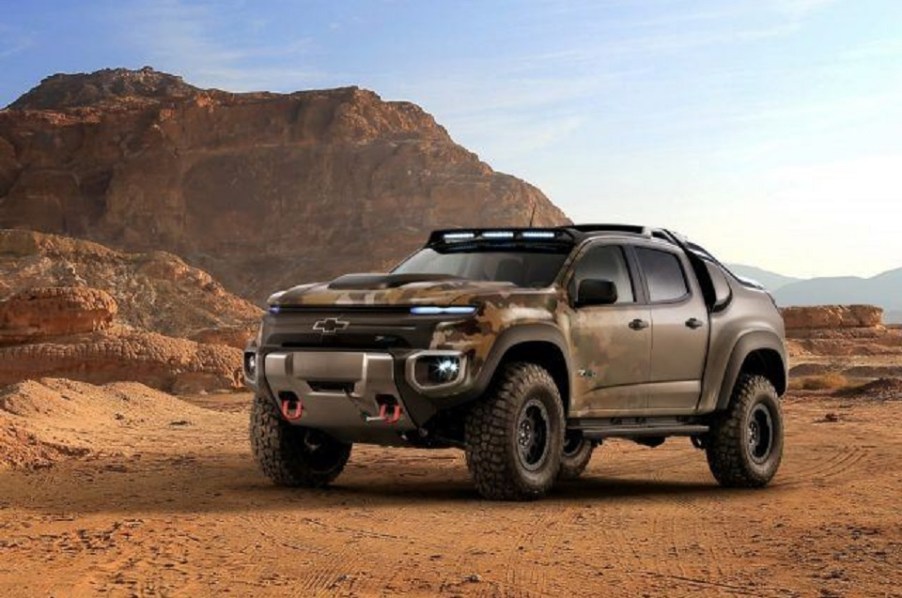
How Hydrogen Could Help the Electric Truck
As we’ve recently covered, electric pickup trucks still have to address several issues challenging their widespread use. And to be fair, these are similar to ones facing diesel and gasoline trucks: towing, torque, and most importantly, range. But while trucks like the Tesla Cybertruck and Rivian R1T have the torque and have the towing capability, range is still an issue. Batteries just don’t have the energy density, and can’t be recharged as quickly, as a conventional fuel tank. But hydrogen may be able to help the electric truck flourish. Here’s how.
How realistic is a hydrogen fuel cell electric truck?
The idea of a hydrogen-powered electric truck isn’t new, although it has recently gained more traction. As Trucks.com reported, Hyundai recently unveiled its HDC-6 Neptune, a semi powered by hydrogen fuel cells. Toyota has also started developing hydrogen fuel cell commercial vehicles, following its Mirai passenger car.
Nikola has also started testing its hydrogen-powered semis, following a $1.7 million grant from the US Department of Energy. Anheuser-Busch plans to order 800 of Nikola’s hydrogen semis. UPS may also express interest, considering its plan to have 40% of its energy to come from non-fossil-fuel sources by 2025.
Even Cummins, the maker of storied diesel engines, is getting into hydrogen. The company has partnered with Hyundai to develop fuel cell technology. Cummins even has a fully-running, in-house built hydrogen fuel cell semi running around.
But why are so many automakers and suppliers investing in hydrogen tech?
How a hydrogen fuel cell electric truck would address weight, range, and recharge times

According to Extreme Tech, and Trucks.com, hydrogen’s biggest advantage is weight. Hyundai’s VP of fuel cells, Sae Hoon Kim, claims that the biggest commercial trucks would need 8 tons of batteries to go more than 300 miles on a charge. Whereas one powered by fuel cells, Kim alleges, would only require 1.5 tons of equipment.
The Toyota Mirai’s chief engineer, Yoshikazu Tanaka, said something similar in his interview with Autoweek. As did the US Department of Energy, in a paper published in 2009. Simply put, a hydrogen fuel cell electric pickup truck would weigh less than a battery-powered one.

Not only that, but Tanaka and the DOE explained that hydrogen is incredibly energy-dense compared to lithium-ion. Per kilogram, the DOE found in 2009 that hydrogen could store roughly 3 times as much energy as a lithium-ion battery. Based on a more-recent CarThrottle report, that hasn’t changed.
What this means is that a hydrogen fuel cell electric truck would have a significantly longer range than a battery-powered one. Nikola claims its hydrogen trucks can go twice as far per ‘recharge’ as the equivalent battery-only ones.

And it’s with recharge time that a hydrogen-powered electric pickup truck really becomes advantageous. Even one of the fastest-charging EVs, the Porsche Taycan, still needs about an hour to fully recharge. But refueling a hydrogen fuel cell electric pickup wouldn’t take more time than refueling a diesel or gasoline one. That would drastically shorten waiting times, and make towing with an electric truck more appealing.
The infrastructure issue
At the moment, what’s holding hydrogen fuel cell vehicles back the most is the infrastructure. Much as with battery EVs, there just aren’t enough refueling/recharging stations. Part of that, as The Verge reported, is the building cost. Not to mention, as Car and Driver reported, the confusing array of charging standards. Tesla uses one plug, Nissan and Mitsubishi another, and everyone else a third kind.
There’s also the issue of making and storing the hydrogen. Splitting water into hydrogen is still a fairly energy-intensive process, although it is getting more efficient. However, unless it’s run using solar or wind power, there’s still the issue of emissions. Hydrogen also needs to be stored under high pressure in tanks, which Roadshow states can eat up storage room unless the truck or car is specially designed for it. Roadshow also remarked that hydrogen prices can sometimes wildly fluctuate.
The infrastructure opportunity

However, hydrogen does have some advantages. For one, storing and transporting hydrogen is much easier than doing the same with batteries. That’s part of the reason why the US Army asked Chevrolet to develop a hydrogen-powered electric truck, not a battery-powered one. A hydrogen refueling station would function more like a traditional gas station, rather than a power station. The hydrogen could even be used to power supplementary generators, which would be cleaner than the diesel ones that sometimes pop up at Supercharger stations
In addition, electric charging stations have limits on how much power they can draw. In Matt Farah’s talk with Chris Harris on The Smoking Tire podcast, Farah discussed how difficult it was to install charge points in his new building. The two also discussed how recharge times and range limit EVs’ utility (warning: spicy language).
Finally, going back to hydrogen-powered semis. If at one point in the future, these commercial vehicles become fully autonomous—with no human on board—it would conceivably be possible to plan their routes more efficiently. If these semis use hydrogen fuel cells, it wouldn’t be too difficult to map out, based on trailer weight and tank capacity, where the most efficient places for hydrogen stations could be. That would mean the owners of these stations could better plan-out their costs and usage, which would, in turn, lower costs overall.
Hydrogen electric trucks still need some work. But they could be what helps the segment grow as a whole.


